Is the worst behind our trailer makers?
Page 58
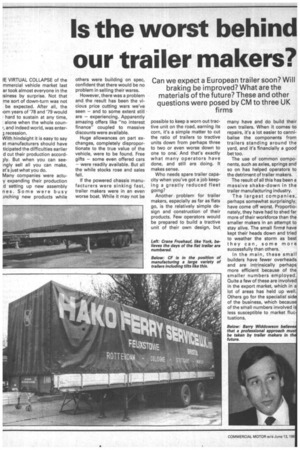
Page 59
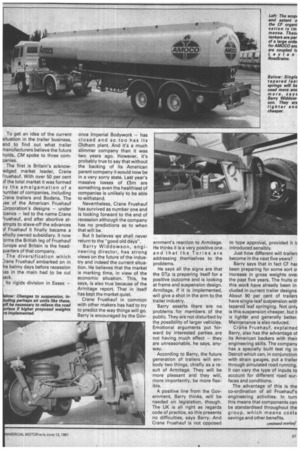
Page 60
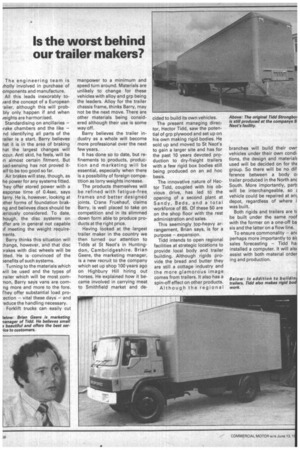
Page 61
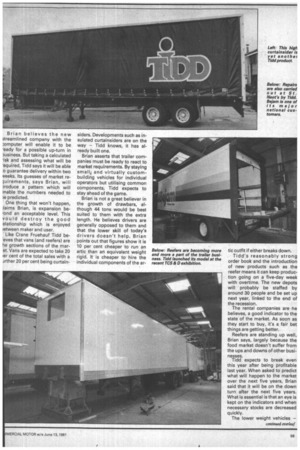
Page 62
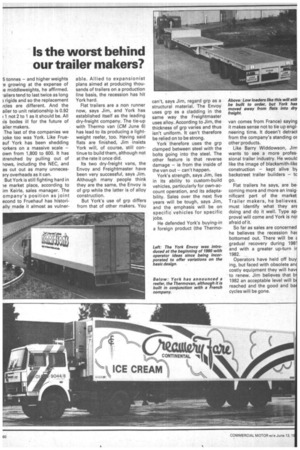
If you've noticed an error in this article please click here to report it so we can fix it.
Can we expect a European trailer soon? Will braking be improved? What are the materials of the future? These and other questions were posed by CM to three UK firms
IE VIRTUAL COLLAPSE of the mmercial vehicle market last ar took almost everyone in the Isiness by surprise. Not that me sort of down-turn was not be expected. After all, the porn years of '78 and '79 would hard to sustain at any time, alone when the whole counand indeed world, was enterg recession.
With hindsight it is easy to say at manufacturers should have ticipated the difficulties earlier d cut their production accordgly. But when you can seeIngly sell all you can make, at's just what you do.
Many companies were actuy expanding their production d setting up new assembly nes. Some were busy inching new products while others were building on spec, confident that there would be no problem in selling their wares.
However, there was a problem and the result has been the vicious price cutting wars we've seen — and to some extent still are — experiencing. Apparently amazing offers like "no interest finance" coupled to massive discounts were available.
Huge allowances on part exchanges, completely disproportionate to the true value of the vehicle, were to be found. Free gifts — some even offered cars — were readily available. But all the while stocks rose and sales fell.
If the powered chassis manufacturers were sinking fast, trailer makers were in an even worse boat. While it may not be possible to keep a worn out tractive unit on the road, earning its corn, it's a simple matter to cut the ratio of trailers to tractive units down from perhaps three to two or even worse down to one to one. And that's exactly what many operators have done, and still are doing. It makes sense.
Who needs spare trailer capa city when you've got a job keeping a greatly reduced fleet going?
Another problem for trailer makers, especially as far as flats go, is the relatively simple design and construction of their products. Few operators would be prepared to build a tractive unit of their own design, but,
many have and do build their own trailers. When it comes to repairs, it's a lot easier to cannibalise the components from trailers standing around the yard, and it's financially a good
bet too.
The use of common compo nents, such as axles, springs and so on has helped operators to the detriment of trailer makers.
The result of all this has been a massive shake-down in the trailer manufacturing industry.
The largest companies, perhaps somewhat surprisingly, have come off worst. Proportionately, they have had to shed far more of their workforce than the smaller makers in an attempt to stay alive. The small firms have kept their heads down and tried to weather the storm as best they can, some more successfully than others.
In the main, these small builders have fewer overheads and are intrinsically perhaps more efficient because of the smaller numbers employed. Quite a few of these are involved in the export market, which in a lot of areas has held up well. Others go for the specialist side of the business, which because of the small numbers involved i less susceptible to market fluc tuations.
To get an idea of the current situation in the trailer business, and to find out what trailer manufacturers believe the future holds, CM spoke to three companies.
The first is Britain's acknowledged market leader, Crane =ruehauf. With over 50 per cent af the total market it was formed ay the amalgamation of a -lumber of companies, including :rane trailers and Bodens. The Jse of the American Fruehauf L'orporation's designs — under icence — led to the name Crane =ruehauf, and after abortive at:empts to stave-off the advances )f Fruehauf it finally became a wholly owned subsidiary. It now 'arms the British leg of Fruehauf Europe and Britain is the headwafters of that company.
The diversification which :rane Fruehauf embarked on in he balmy days before recession ;las in the main had to be cut ack.
Its rigids division in Essex — once Imperial Bodywork — has closed and so too has its Oldham plant. And it's a much slimmer company than it was two years ago. However, it's probably true to say that without the backing of its American parent company it would now be in a very sorry state. Last year's massive losses of £5m are something even the healthiest of companies is unlikely to be able to withstand.
Nevertheless, Crane Fruehauf has survived as number one and is looking forward to the end of recession although the company has no predictions as to when that will be.
But it believes we shall never return to the "good old days".
Barry Widdowson, engineering director, has strong views on the future of the industry and indeed the current situation. He believes that the market is marking time, in view of the economic situation. This, he says, is also true because of the Armitage report. That in itself has kept the market quiet.
Crane Fruehauf in common with other makers has had to try to predict the way things will go. Barry is encouraged by the Goy
ernment's reaction to Armitage. He thinks it is a very positive one and that the Tories are addressing themselves to the problems.
He says all the signs are that the DTp is preparing itself for a positive outcome and is looking at frame and suspension design. Armitage, if it is implemented, will give a shot in the arm to the trailer industry.
Barry asserts there are no problems for members of the public. They are not disturbed by the possibility of larger vehicles. Emotional arguments put forward by interested parties are not having much effect — they are unreasonable, he says, anyway.
According to Barry, the future generation of trailers will embody two things, chiefly as a result of Armitage. They will be more pleasant and they will, more importantly, be more flexible.
A positive line from the Government, Barry thinks, will be needed on legislation, though. The UK is all right as regards code of practice, so this presents no difficulties, says Barry. And Crane Fruehauf is not opposed to type approval, provided it iE introduced sensibly.
Just how different will trailer: become in the next five years?
Barry says that in fact CF has been preparing for some sort o. increase in gross weights ovei the past five years. The fruits 01 this work have already been included in current trailer designs About 90 per cent of trailers have single-leaf suspension with tapered leaf springing. Not only is this suspension cheaper, but it is lighter and generally better. Maintenance is also reduced.
Crane Fruehauf, explained Barry, also has the advantage of its American backers with their engineering skills. The company has a specially built test rig in Detroit which can, in conjunction with strain gauges, put a trailer through simulated road running. It can vary the type of inputs to account for different road surfaces and conditions.
The advantage of this is the co-ordination of all Fruehauf's engineering activities. In turn this means that components can be standardised throughout the group, which means costs savings and other benefits.
The engineering team is /holly involved in purchase of omponents and manufacture. All this leads inexorably toiard the concept of a European -ailer, although this will probbly only happen if and when leights are harmonised.
Standardising on ancillaries — 'rake chambers and the like — nd identifying all parts of the railer is a start. Barry believes hat it is in the area of braking hat the largest changes will iccur. Anti skid, he feels, will be in almost certain fitment. But Dad-sensing has not proved itelf to be too good so far.
Air brakes will stay, though, as he power for any systems fitted. They offer stored power with a esponse time of 0.4sec, says larry. He is, however, looking at )ther forms of foundation brakng and believes discs should be ;eriously considered. To date, hough, the disc systems on )ffer are in general not capable if meeting the weight requirenents.
Barry thinks this situation will :hange, however, and that disc )rakes with disc wheels will be itted. He is convinced of the )enefits of such systems.
Turning to the materials which mill be used and the types of railer which will be most corn-non, Barry says vans are cornng more and more to the fore. rhey offer substantial load pro:ection — vital these days — and -educe the handling necessary. Forklift trucks can easily cut
manpower to a minimum and speed turn around. Materials are unlikely to change for these vehicles with alloy and grp being the leaders. Alloy for the trailer chassis frame, thinks Barry, may not be the next move. There are other materials being considered although their use is some way off.
Barry believes the trailer industry as a whole will become more professional over the next few years.
It has done so to date, but refinements to products, production and marketing will be essential, especially when there is a possibility of foreign competition as lorry weights increase.
The products themselves will be refined with fatigue-free frames and better designed joints. Crane Fruehauf, claims Barry, is well placed to take on competition and in its slimmed down form able to produce products at the right price.
Having looked at the largest trailer maker in the country we then turned our attention to Tidds at St Neot's in Huntingdon, Cambridgeshire. Brian Geere, the marketing manager, is a new recruit to the company which set up shop 100 years ago on Highbury Hill hiring out horses. He explained how it became involved in carrying meat to Smithfield market and de
cided to build its own vehicles.
The present managing director, Hector Tidd, saw the potential of grp plywood and set up on his own making rigid bodies. He sold up and moved to St Neot's to gain a larger site and has for the past 10 years devoted production to dry-freight trailers with a few rigid box bodies still being produced on an ad hoc basis.
The innovative nature of Hector Tidd, coupled with his obvious drive, has led to the opening of a second plant at Sandy, Beds, and a total workforce of 85. Of these 50 are on the shop floor with the rest administration and sales.
This seemingly top-heavy arrangement, Brian says, is for a purpose — expansion.
Tidd intends to open regional facilities at strategic locations to provide local body and trailer building. Although rigids provide the bread and butter they are still a cottage industry and the more glamorous image comes from trailers. It also has a spin-off effect on other products.
Although the regional
branches will build their owr vehicles under their own condi• tions, the design and materials used will be decided on for thE group. So there will be no dif. ference between a body 01 trailer produced in the North anc South. More importantly, parts will be interchangeable, so E vehicle could be repaired at an depot, regardless of where i was built.
Both rigids and trailers are tc be built under the same roof with the former on a one-off ba sis and the latter on a flow line.
To ensure commonality — an perhaps more importantly to aic sales forecasting — Tidd ha: installed a computer. It will als< assist with both material order ing and production.
Brian believes the new streamlined company with the -...omputer will enable it to be -eady for a possible up-turn in Dusiness. But taking a calculated isk and assessing what will be .equired, Tidd says it will be able o guarantee delivery within two veeks. Its guesses of market reiuirements, says Brian, will )roduce a pattern which will nable the numbers needed to )e predicted.
One thing that won't happen, :laims Brian, is expansion berond an acceptable level. This vould destroy the good elationship which is enjoyed )etween maker and user.
Like Crane Fruehauf Tidd beeves that vans (and reefers) are he growth sections of the maret. Vans are expected to take 20 ier cent of the total sales with a Jrther 20 per cent being curtain
siders. Developments such as insulated curtainsiders are on the way — Tidd knows, it has already built one.
Brian asserts that trailer companies must be ready to react to market requirements. By staying small, and virtually custombuilding vehicles for individual operators but utilising common components, Tidd expects to stay ahead of the game.
Brian is not a great believer in the growth of drawbars, although 44 tons would be best suited to them with the extra length. He believes drivers are generally opposed to them and that the lower skill of today's drivers doesn't help. Brian points out that figures show it is 10 per cent cheaper to run an artic than an equivalent weight rigid. it is cheaper to hire the individual components of the ar
tic outfit if either breaks down.
Tidd's reasonably strong order book and the introduction of new products such as the reefer means it can keep production going on a five-day week with overtime. The new depots will probably be staffed by around 30 people and be set up next year, linked to the end of the recession.
The rental companies are he believes, a good indicator to the state of the market. As soon as they start to buy, it's a fair bet things are getting better.
Reefers are standing up well, Brian says, largely because the food market doesn't suffer from the ups and downs of other businesses.
Tidd expects to break even this year after being profitable last year. When asked to predict what will happen to the market over the next five years, Brian said that it will be on the down turn after the next five years. What is essential is that an eye is kept on the indicators and when necessary stocks are decreased quickly.
The lower weight vehicles — ccmfinued overleaf 5 tonnes — and higher weights .e growing at the expense of e middleweights, he affirmed. 'ailers tend to last twice as long rig ids and so the replacement icles are different. And the ailer to unit relationship is 0.92 I 1 not 2 to 1 as it should be. All is bodes ill for the future of ailer makers.
The last of the companies we )oke too was York. Like Frueauf York has been shedding ,orkers on a massive scale — own from 1,800 to 600. It has trenched by pulling out of lows, including the NEC, and as cut out as many unnecesary overheads as it can.
But York is still fighting hard in le market place, according to im Keirle, sales manager. The ompany's position as joint econd to Fruehauf has histori ally made it almost as vulner able. Allied to expansionist plans aimed at producing thousands of trailers on a production line basis, the recession has hit York hard.
Flat trailers are a non runner now, says Jim, and York has established itself as the leading dry-freight company. The tie-up with Thermo van (CM June 6) has lead to its producing a lightweight reefer, too. Having said flats are finished, Jim insists York will, of course, still continue to build them, although not at the rate it once did.
Its two dry-freight vans, the Envoy and Freightmaster have been very successful, says Jim. Although many people think they are the same, the Envoy is of grp while the latter is of alloy construction.
But York's use of grp differs from that of other makers. You can't, says Jim, regard grp as a structural material. The Envoy uses grp as a cladding in the same way the Freightmaster uses alloy. According to Jim, the thickness of grp varies and thus isn't uniform. It can't therefore be relied on to be strong.
York therefore uses the grp clamped between steel with the bolts going into the steel. The other feature is that reverse damage — ie from the inside of the van out can't happen.
York's strength, says Jim, lies in its ability to custom-build vehicles, particularly for own-account operation, and its adaptability. Sales over the next five years will be tough, says Jim, and the emphasis will be on specific vehicles for specific jobs.
He defended York's buying-in a foreign product (the Thermo van comes from France) saying it makes sense not to tie up engineering time. It doesn't detrac1 from the company's standing or other products.
Like Barry Widdowson, Jim wants to see a more professional trailer industry. He would like the image of blacksmith-like construction — kept alive by backstreet trailer builders — tc go.
Flat trailers he says, are becoming more and more an insignificant part of the market Trailer makers, he believes must identify what they are doing and do it well. Type approval will come and York is nu afraid of it.
So far as sales are concerned he believes the recession ha: bottomed out. There will be q. gradual recovery during 1981 and with a greater up-turn 1982.
Operators have held off buy ing, but faced with obsolete an costly equipment they will hay to renew. Jim believes that b 1982 an acceptable level will b reached and the good and ba cycles will be gone.












































































































































